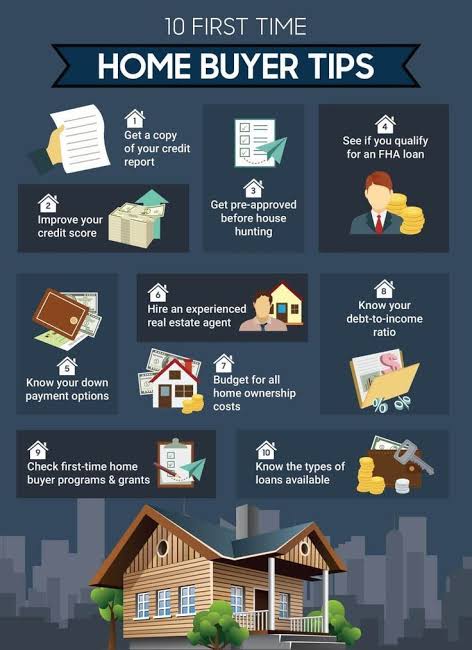Physical Address
60 Ekwema Cres, Layout 460281, Imo
Physical Address
60 Ekwema Cres, Layout 460281, Imo

Home Loan: Achieving the milestone of buying your first home is significant, yet several considerations precede contacting your real estate agent. As a first-time homebuyer, you must qualify for a mortgage based on factors like your credit score, income, down payment, and debt level.
Additionally, ensuring your readiness for homeownership is crucial, taking into account expenses such as closing costs, property taxes, and ongoing maintenance and repairs.

This guide for first-time homebuyers is designed to assist you in making informed decisions. You will discover how to obtain mortgage approval and essential factors to ponder before finalizing your purchase.
Furthermore, you’ll explore first-time homebuyer programs available for your benefit and home loans tailored for those buying their first home. Let’s delve into the details.
Also read: 88 Customers Exposed in South Africa’s First National Bank Glitch
To qualify for a home loan, several factors come into play:
Government-backed loans, such as those guaranteed by the Veterans Administration (VA), Federal Housing Administration (FHA), and U.S. Department of Agriculture (USDA), typically offer more lenient qualifying requirements compared to conventional loans, which lack government guarantees.
Also read: EFCC Blocks 1,146 Bank Accounts Involved in Unauthorized Foreign Exchange Deals
When it comes to credit scores for home loans, the minimum requirements vary among lenders for conventional loans. Major credit scoring models, such as the FICO® Score, operate on a scale from 300 to 850, where scores of 740 or higher are considered very good or excellent.
Typically, mortgage lenders prefer to see a credit score of at least 620, categorized as a fair credit score. However, to secure loans with the most competitive rates, a score of around 740 or above is ideal.
For government-backed loans like FHA, VA, and USDA loans, the credit score requirements are more lenient. With an FHA loan, for instance, you can qualify with a minimum score of 500 if you make a 10% down payment or 580 with a 3.5% down payment.
VA loans don’t have a specific minimum credit score, but many lenders prefer to see a score of 620 or higher. Similarly, while USDA loans don’t set a minimum credit score, lenders often look for scores of 640 or higher.
Mortgage lenders assess your ability to afford a mortgage by examining both your income and your existing debt levels. They consider two key debt-to-income ratios:
Your employment history plays a crucial role in demonstrating income stability to lenders. For both conventional and FHA loans, it’s typically necessary to show steady income over the past two years.
Documents such as tax returns, pay stubs, W-2s, and 1099s are used to verify consistent earnings. While VA and USDA loans offer some flexibility, most lenders still expect regular employment history.
Lenders may scrutinize gaps in employment, frequent job changes, or significant fluctuations in income. These factors can impact how much of your income lenders consider when calculating your debt-to-income ratio.
Self-employed individuals may face additional verification requirements, as income from an external employer is often viewed as more reliable.
Although lenders vary in their flexibility regarding employment history requirements, some may approve loans without strict adherence to a two-year employment period, depending on individual circumstances.
For a first-time homebuyer, having enough funds for a 20% down payment is ideal. This would translate to $40,000 for a $200,000 home purchase. However, many borrowers find it challenging to meet this target.
Conventional mortgages are available with down payments as low as 3%, but this may require a higher credit score or lower debt-to-income ratio. Alternatively, USDA or VA loans offer the option of no down payment, while FHA loans require just 3.5% down with a credit score of at least 580.
It’s important to note that while VA loans do not require mortgage insurance, FHA and USDA loans do. Conventional lenders also mandate private mortgage insurance (PMI) for down payments under 20%. PMI protects lenders in case of foreclosure but does not provide borrower protection for missed payments.
Many mortgage options allow you to use a down payment gift from relatives or friends. Some loans, like FHA, VA, and USDA loans, even permit covering the entire down payment with a financial gift from someone else.
Also read: Payday Loan: How to Apply and Access
The best home loan for a first-time buyer depends on several factors, including financial credentials and the size of the down payment. Government-backed loans like FHA, VA, or USDA loans are often easier for first-time buyers to qualify for.
However, if you have good credit, a low debt-to-income ratio, and a reasonable down payment, a conventional loan might offer lower fees and a better interest rate compared to government-backed options.
When shopping for a home loan, it’s advisable to get quotes from at least three lenders. Look for lenders offering pre-qualification without a hard credit check to avoid negative impacts on your credit score. Key factors to consider when comparing quotes include:
For most borrowers, a fixed-rate mortgage offers payment consistency. However, those planning to move or refinance soon might prefer an ARM for lower initial costs. It’s important to note that high-risk loans like interest-only or balloon payment loans are generally not recommended.
Also read: Burkina Faso suspends BBC Africa and VOA over Human Rights Abuse Report Coverage
Embarking on the journey to homeownership is a blend of excitement and challenges. For first-time home buyers, avoiding common mistakes is key to a smooth process. Understanding first-time home buyer loan requirements and potential pitfalls beforehand can save you time and money in the long term.
Being aware of these mistakes and addressing them proactively can enhance your chances of a successful and financially sound home buying experience.
Also read: Nigerian Edtech Platform Dexude gets Funding from Business Finland TEMPO
In conclusion, embarking on the journey to homeownership as a first-time buyer is both exciting and challenging. It’s crucial to understand the key factors that impact your ability to qualify for a home loan, such as your credit score, debt-to-income ratio, and employment history.
Exploring different mortgage loan programs, including government-backed options like FHA, VA, and USDA loans, can provide flexibility and accessibility for those with varying financial situations.
Avoiding common mistakes, such as not choosing the right loan program, neglecting credit score improvement, and not saving enough for upfront costs, is essential for a successful home buying experience.
Comparing mortgage quotes from multiple lenders and understanding the nuances of interest rates, loan terms, and fees can help you make informed decisions.
Ultimately, with careful preparation, financial readiness, and a clear understanding of the home buying process, you can achieve your dream of owning your first home while minimizing unnecessary costs and pitfalls along the way.
Interact with us via our social media platforms:
Facebook: Silicon Africa
Instagram: Siliconafricatech
Twitter: @siliconafritech